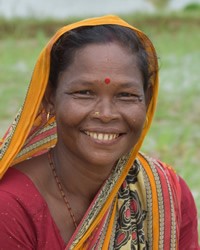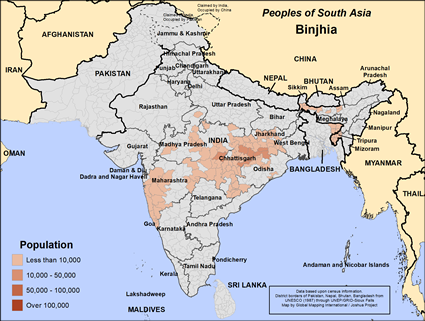Binjhia in Bangladesh

Photo Source:
debjanixyz - Pixabay
|

Map Source:
People Group data: Omid. Map geography: UNESCO / GMI. Map Design: Joshua Project.
|
| People Name: | Binjhia |
| Country: | Bangladesh |
| 10/40 Window: | Yes |
| Population: | 6,900 |
| World Population: | 187,900 |
| Primary Language: | Sylheti |
| Primary Religion: | Hinduism |
| Christian Adherents: | 2.04 % |
| Evangelicals: | 0.00 % |
| Scripture: | New Testament |
| Ministry Resources: | Yes |
| Jesus Film: | Yes |
| Audio Recordings: | Yes |
| People Cluster: | South Asia Tribal - other |
| Affinity Bloc: | South Asian Peoples |
| Progress Level: |
|
Introduction / History
The Binjhwari, also known as the Binjhal, live in several states: Madhya Pradesh, Maharashtra, Bihar, and West Bengal. It is uncertain as to whether their native language, called Binjhwari, is of Dravidian or Indo-Aryan origin. In Bangladesh they speak Sylheti, the language of the region they live in.
What Are Their Lives Like?
Most Binjhia are farmers. For them, land has both economic value and social status. The main crop is rice (grown in a flooded field). They also grow some winter vegetables such as tomatoes, chilies, cucumbers and pumpkins. They learned their farming techniques from neighboring Hindu tribes. Weeding is usually done by the women.
Many Binjhia have no land of their own, and work others' land as hired laborers. Some work on a daily wage basis, while others work on yearly contracts. The daily laborers are either paid in cash or in rice.
The Binjhia are self-sufficient, living on what they raise in their gardens. Although they do not depend on the weekly markets for their food, they do visit the markets to purchase items such as salt, kerosene, tobacco, dried fish and cloth.
Binjhia villages are medium in size, consisting of 20 to 50 families. Each family lives in one or two roomed mud houses with thatched roofs. The tiny huts line both sides of the main village street. Overall, their living conditions are not very sanitary. Their goats and fowl are allowed to roam freely inside.
Binjhia have no tradition of organized government. Unlike many other tribal groups, they have no formal village council. Instead, the elderly villagers deal with any social issues or conflicts that arise. Final decisions are made by all of the adult villagers.
Binjhia men and women must wait until they are adults before they are married. Marriages are not arranged; young adults are free to choose their future mates. Weddings always begin on Sundays and last for several days.
Binjhia women are fond of wearing jewelry such as bracelets, necklaces, and armlets made of silver, brass, and beads. Beaded necklaces are their favorite.
What Are Their Beliefs?
Because the Binjhia have had much contact with Hindus, they are classified as a Hindu tribe. Though they have adopted many Hindu gods and goddesses, they also still practice a form of their own ethnic religion. They have a village deity named Budharaja. Their supreme deity, Bindya Basini, is represented by a stone in the shape of a woman. They believe she looks after the welfare of the Binjhia, protecting them from all danger. Many other gods are also kept in their homes. They make offerings of raw rice, milk, sweets, liquor, and fruit to these gods. They sacrifice a goat when their first child is born.
Ancestor worship (praying to deceased ancestors) is another common practice. Because the Binjhia believe that their ancestors are reborn as children, children are worshipped at a festival once a year.
What Are Their Needs?
Quality laborers are one of the greatest needs. There is also a great need for Christian resources to be made available to these people.
Prayer Points
Ask the Lord of the harvest to thrust forth loving and dedicated laborers to live and work among the Binjhia.
Pray for them to have the spiritual hunger it takes to embrace Christ no matter what the cost.
Pray for Binjhia disciples who will make more disciples.
Pray for the Lord to give them a record high harvest as a testimony of his power and love.